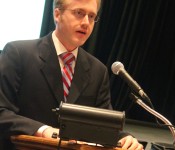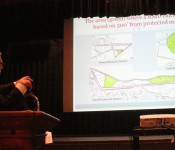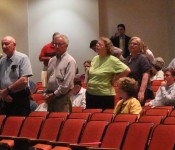8:40 p.m.: Now the school department budget with Chair Laurie Slap providing an overview of the achievements and what’s up. The issues facing the schools is, of course, exploding enrollment, increasing class size, greater special needs and strains on the staff and budget. She highlights all the students who are coming “across the world” 102 to 182 students needing help in English instruction.
The future is scary as 500 new students could be coming to the district in the next decade. Short-term, the department will attempt to cope with the enrollment boom; long term, the need will be additional space. While renovating the high school, it may need to be a 8th grade to 12th grade.
But how to keep this great district sustainable? It will focus on studying the finances with a subcommittee, using “trend modeling” groups and other issues.
Superintendent Kingston discuss the three pillars that keep Belmont as a top level 3 status, a rare achievement.
The primary cost drivers are salaries, enrollment and special ed while losing federal grants. The real cost to run the district is $52.4 million, with the general fund request of $46.2 million, a four percent increase.
8:57 p.m.: Discussion from the members: Yes. Christine Doyle, pct. 1, asks how much the additional tax, such as student fees, is being paid to the district; her family is paying $1,100. Kingston agrees that is an issue but they are trying to keep them level.
Rachel Berger, pct. 2, said there is a lot of user fees, such as 60 percent of the athletic department. Outside fees supports so much “and this is not a Cadillac budget, it’s not even your father’s Oldsmobile budget” and the town will need more funding to keep this level of education.
Kimberly Becker, pct 6, said the “O” word; override, which needs to be placed on the November ballot to get the greatest level of voting.
Paul Roberts, pct. 8, said there are already changes being made due to limited budget such as teaching team structures at the Chenery Middle School. He worries that modular classrooms will be used to save money because we don’t have the money. What other examples of budget constraints if impacting the schools today? Kingston said the elimination of the fifth grade foreign language was one example. “Sometimes we have to make
Anne Mahon, pct. 5, said “Don’t kid yourself, a level service budget doesn’t do our kids anything.” Help the schools by playing an override in November.
This is a roll call vote with the e-voting system which comes out overwhelmingly in support of the school budget.
9:28 p.m.: After a short “stretch” break, the Minuteman Regional High School appropriation of $751,000, which is lower by nearly 12 percent, or $100,000, from last year’s budget due to lower enrollment, while the school’s total enrollment has increased along with a boom in out-of-district student tuition. Approved with little debate.
The final budget item, the debt and interest, in the fiscal ’15 budget is approved.
Belmont now has its fiscal 2015 budget coming in at $95.2 million.
9:50 p.m.: Article 21: Authorization to Transfer Balances to Fund the ’15 Budget. A straight forward transfer to keep the upcoming budget out of the red. 204 in favor and 6 opposed.
Now we are at Article 22: Authorization for Up-Front Funds for Chapter 90 Highway Improvements. That’s $534,000 from the state to repair our roads. Passes easily.
And Widmer agrees to go forward with the Capital Budget. Ann Marie Mahoney, committee chair, said they had $4.3 million in requests from all departments, but only with available funds of $1.4 million. Unlike past years, there is no “big ticket” items although there was some of those from the library, the schools or the Belmont Center reconstruction project. There will be a snow blower, $200,000 in sidewalk maintenance, $133,000 in building envelop improvements, only two town vehicles, a new surface for the Town Field’s basketball courts and a fingerprinting “livescan” system. Mahoney said she would love to have $3 million a year that doesn’t rely on one-time funds.
“We need more revenue, more predictable revenue,” said Mahoney.
Roger Colton, pct. 6, has submitted an amendment to the capital budget article, who will add $30,000 to the sidewalk maintenance budget by taking it from the Grove Street Master Plan. The Warrant Committee voted 7 to 7 on the amendment and the Capital Budget Committee voted one for, two against and one not voting. Colton said this is just the sort of question that Town Meeting was created; to make priorities. He said residents asked why give money to the schools when the sidewalks aren’t repaired. He said when the town has to go to the voters for an operational override, it must show that Town Meeting has their priorities straight.
Mahoney has submitted her own amendment to the amendment that would take the $30,000 and place it in three other requests. She said she had hoped that Colton had come to the committee’s meeting to hear the debate on the request.
Andy Rojas said he placed the request for the neighbors who are in conflict with youth sports specifically baseball. A master plan will be help control the ad hoc nature of our parks that are “overused and underfunded” which will be the first step with Community Preservation Committee funding coming afterwards to implement the plan’s recommendations. Colton’s amendment is a “false argument.”
Chris Doyle, pct 1, why can’t the master plan be paid for by the CPC and what’s the shelf life of a master plan. Rojas said the CPC will not pay for it and the master plan (he is backed up by Town Treasurer Floyd Carman) for a park like this is five years. How about the youth baseball people pay for the master plan. Rojas said the baseball people do play their fair share.
Swift Hart, pct 4, said she had seen the town pay for plans that could not be implemented and why not an overall recreation plan instead of being driven by a neighborhood that’s angry about parking.
Deb Lockett, pct. 7, a neighbor to the Grove Park, said she was concerned it was coming out of the overburdened Capital Budget. After a series of conversations, Lockett said the selectman had promised that a master plan would be coming and this is the follow up. It can also spur other reports for other parks and the CPC will then pay for them. So while agreeing with some of Colton’s arguments, she can’t support it because this expenditure will result in critical answers.
Paul Roberts, pct. 8, said he hopes the selectmen are “listening” to Mahoney, Libenson and Slap the town does not have the revenues needed to support all the needs; an override is needed.
James Stanton, pct. 1, said why pay an outside consultant $30,000 when this should be a job of the selectmen (to cheers).
11 p.m.: Town Meeting has now reached its fourth hour, just as long as it took Belmont High baseball to play that marathon 16-inning game on Friday night. One member told me that Town Meeting would be completed tonight. HA!
Donna Ruvolo, pct. 7, said she finds paying $30,000 for a report a bit bewildering but the park, which is now being mismanaged, is in need of a plan to save it. “This is our property” as a town, not for a single neighborhood. “The entire town should have a voice in deciding this issue,” said Ruvolo.
A Scott Sheffield who is not a member but is allowed to speak on the measure. The 10-acre park – in a densely urban areas – does not have the amenities like so many parks in surrounding towns. For $30,000, that could be accomplished.
The motion has been moved and the e-vote in underway. 69 to 114 against. Colton’s amendment is defeated.
The capital budget is approved by a very tired meeting. Time to go home. It’s 11:19 p.m.
See you Wednesday.


